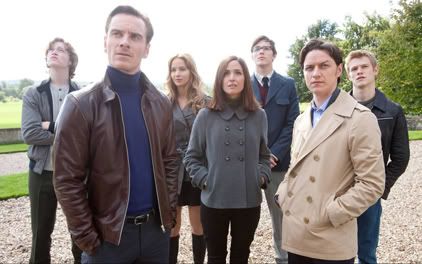
Sex without the pleasure — and you thought starving to death in an Irish prison was rough. Following Hunger, director Steve McQueen's new collaboration with Michael Fassbender is a similarly self-destructive character study. Shame stars the latter as Brandon Sullivan, a sex-addicted New York businessman whose explicit lifestyle is threatened by the surprise arrival of his orphaned sister (Carey Mulligan). Loaded with full-frontal male and female nudity and graphic depictions of sex, the NC-17 rated flick may not be coming to a theater near you.
Far from crass or exploitative, however, McQueen's film succeeds in making Brandon's many lascivious liaisons feel obligatory rather than erotic. Shame is Requiem for a Dream for sex. A gorgeously shot but emotionally upending orgy late in the film drives home the utter desperation of the act in a prolonged close up on Brandon's contorted face. Excited yet?
McQueen's flirted with minimalism before. Smack dab in the middle of Hunger is a seventeen and a half minute static shot in which Fassbender's character dialogues with a priest. While it showcases two terrific performances, such laissez-faire filmmaking techniques do little for me. Shame likewise features long, deliberate takes, but McQueen's evolution as a director is apparent from his dynamic use of the frame.
For example, during a dinner date between Brandon and his coworker (Nicole Beharie), a subtle camera push-in (from the wide restaurant interior, bustling with the comings and goings of patrons and waiters, to an intimate two shot) keeps the emphasis on the performances without needlessly drawing attention to the process. It's the rare circumstance where more is actually less. Conversely, the extreme close up of Carey Mulligan's face when she performs a heart-wrenching rendition of "New York, New York" works because she fills the entire frame. By comparison, the aforementioned sequence in Hunger is visually flabby, full of superfluous space.
But Shame isn't just a technical triumph — even more compelling is what's in the abstract. Fassbender's alluringly enigmatic portrayal of his volatile character is the centerpiece of a complex, cerebral story. Brandon carries his addiction like a ticking time bomb in his breast pocket, and things get particularly uncomfortable with his vulnerable (and oddly familiar) sister around. Their relationship adds a grimy layer of squeamish tension to the film.
Unhappiness manifests itself in many shapes in Shame, from Brandon's insatiable carnal appetite to the loneliness of the women in his life. Incapable of transcending their physical connections, the characters share sex or blood, but don't understand each other or strive to communicate better. The result is intercourse that frequently comes across dehydrating, disgusting, or dehumanizing. Sometimes all three!
Shame isn't without its moments of levity. McQueen's subtle humor saves him from slipping into the mire of downbeat melodrama. James Badge Dale plays Brandon's wingman (or is it the other way around?), whose paper-thin personality and repeated drunken strikeouts never fail to conjure a smirk. Also, I'm not sure there's a world where getting caught masturbating isn't at least a little funny. But leave it to Steve McQueen and Michael Fassbender to make it captivating too.
The culmination of lesser successes, Shame sees both actor and director at their best. Fassbender makes Brandon's incongruities flesh (so to speak), and McQueen strikes the perfect balance between minimalistic staging and cinematic artistry. Shame is an ambitious, ambiguous film that ranks easily among the year's best. Plus, you get to see Michael Fassbender naked. There's also that.
4/5




















